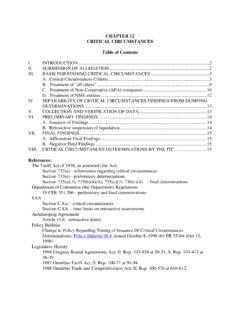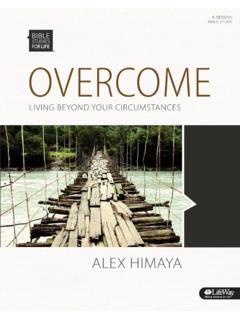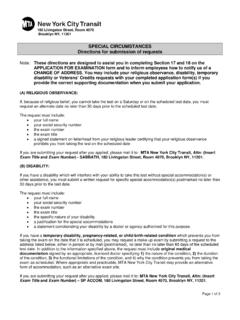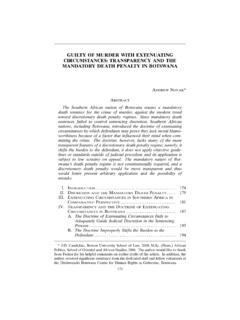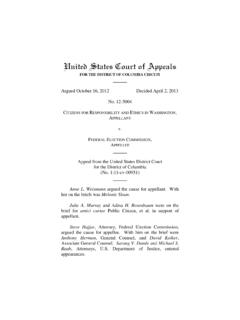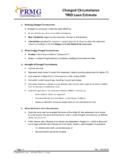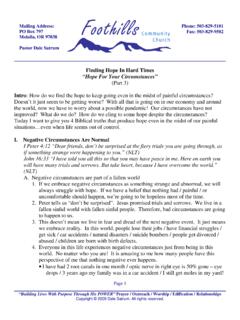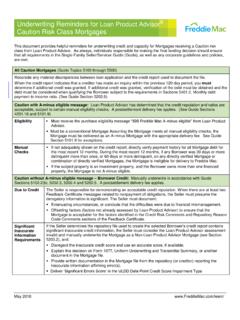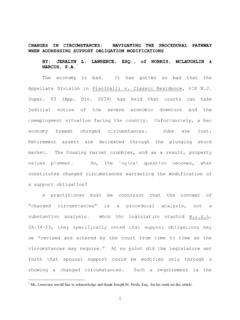Transcription of CHALLENGES TO 'FACTS AND CIRCUMSTANCES'—A …
1 CHALLENGES TO 'FACTS AND circumstances ' A. STANDARD WHOSE TIME HAS PASSED? Author: ELIZABETH J. KINGSLEY. (Originally published in the journal Taxation of Exempts, Volume 20, Number 05, March/April 2010). Lawyers who advise politically active nonprofits have grown used to applying a "facts and circumstances " test to determine when their clients' activities will be treated as political campaign intervention. That phrase is recited so often it becomes commonplace and unquestioned. Those whose ears have become inured to it may therefore benefit from a conversation with anyone who has taken a class in constitutional law but has not since become steeped in the arcana of tax-exempt organizations 1.
2 Viewed from a constitutional perspective, it seems shocking that the standard used by the government to determine when a charity's speech is permissible is in its entirety whether, under all the facts and circumstances , it intervened in a political campaign. The IRS, it seems, is perfectly comfortable or at least willing to accept as its role enforcing a rule that in practice often approaches "we know it when we see it" as the standard to define political speech that is prohibited (for 501(c)(3)s) or limited (for 501(c)(4)s, 501(c)(5)s, or 501(c)(6)s). First Amendment analysis alone suggests that this test is unconstitutionally vague, neither providing the regulated community with sufficient notice regarding what speech is restricted nor sufficiently curtailing the discretion of government officials.
3 The constitutional analysis is certainly complicated by the context of tax exemption (and for charities, deductibility of contributions), which is viewed as a subsidy. It is not at all obvious, however, why even a subsidy can justify establishing a standard that is so ill-defined and subject to discriminatory enforcement as the facts and circumstances rule for campaign intervention. A. pair of cases filed earlier this year seeks to put this same question in front of the judiciary. The litigation The cases in question were filed by the same counsel on the same day in two different circuits.
4 Clearly a coordinated legal strategy. One, Catholic Answers and Karl Keating v. , was brought in California by a Section 501(c)(3) organization. It CHALLENGES the Service's determination that two "E-letters" posted on its Web site were intervention in the 2004 presidential election in opposition to John Kerry. The other, Christian Coalition of Florida v. , CHALLENGES the denial of Section 501(c)(4) status for an organization because (1) its voter guides and related activities were found to constitute campaign intervention and (2) the extent of those activities resulted in its not engaging primarily in the promotion of social welfare.
5 This is a double application of "facts and circumstances " both the characterization of the activity as political intervention and the determination of the organization's "primary" activity are based simply on "all the facts and circumstances " with no more specific modifier. Although Catholic Answers was dismissed on October 14, only two weeks after oral arguments on the government's motion to dismiss 2, Christian Coalition is still making its way through the court system. The facts of each case present interesting applications of the facts and circumstances test. Procedural aspects as well as the recent dismissal of Catholic Answers also illustrate the CHALLENGES to litigants seeking to bring a constitutional challenge to this tax 1.
6 Try it. Ask a non-tax lawyer what he or she thinks of "fact and circumstances " as a test for permissible political speech. 2. As of this writing, the plaintiffs had not announced whether they plan to appeal the dismissal. standard, including the tactics the IRS often employs to avoid a judicial determination of the constitutionality of "facts and circumstances " as a test for permitted speech. Catholic Answers is a Section 501(c)(3) public charity that published a "Voter's Guide for Serious Catholics," which set out five 'non-negotiable' issues it thought voters should use to assess candidates for office.
7 Interestingly, according to the court opinion dismissing Catholic Answers'. complaint, the IRS conceded that this guide alone did not constitute campaign intervention, despite its use of divisive "litmus test" issues to instruct readers how to vote. On two occasions in 2004, however, the organization published "E-letters" by its president, Karl Keating, on its Web site. These public letters argued that then-candidate Kerry should be denied communion at Catholic Mass and rebuked by Church authorities 3. They did not expressly direct anyone to vote against Senator Kerry, or explicitly discuss his candidacy, but implicitly discussed him as a candidate by referring to the Voter's Guide and stating that he "is wrong on all five 'non- negotiable' issues.
8 " The discussion focused primarily, however, on the proper Catholic position regarding elected officials who vote to maintain the legality and availability of abortion. On audit, the IRS determined that both letters constituted intervention in opposition to Senator Kerry's candidacy. It imposed excise taxes of $ on the associated expenditures under Section 4955, based on the Service's determination (using some unknown methodology) that the cost of these two messages was $ In order to "correct" the expenditure and avoid the second-tier excise taxes, Mr. Keating reimbursed this amount to the charity.
9 The organization also applied for a refund of the excise tax paid, on the grounds that the communications did not constitute political intervention. The IRS allowed the refund, indicating it was doing so as a discretionary matter and not conceding the characterization of the E-letters. Catholic Answers brought suit claiming that it was not free to return the "correction" payment to Mr. Keating because the IRS had not agreed with its characterization of the letters but refunded the tax as a discretionary matter. The government moved to dismiss this case claiming that, since it refunded the taxes paid, the matter is moot and the plaintiffs lack standing.
10 It also asserted that Catholic Answers is precluded from raising the constitutional issues now because it did not explicitly include them in its request for a refund. A hearing on the motion was held September 28, and on October 14 the court granted the government's motion. It found that the plaintiff lacked statutory standing to bring a refund action when the excise taxes have been repaid, that Mr. Keating did not himself pay a tax and so has no standing, that the organization failed to raise the legal issues it now sought to have resolved in its refund request, and that the doctrine of "capable of repetition yet evading review" was inapplicable.
